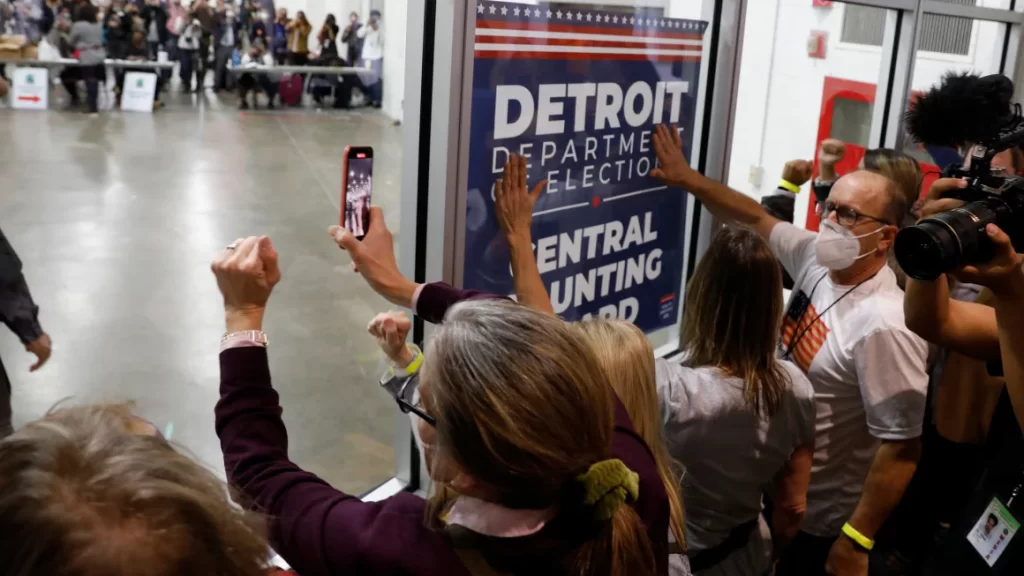Every few weeks, a unique gathering takes place: active-duty and retired police officers come together with election officials to discuss potential crisis scenarios for Election Day. What if someone shows up at a polling place with an assault rifle? Or what if a bomb threat is called in using AI to impersonate a county clerk’s voice?
These sessions, held across the country, have become crucial as election workers increasingly face harassment and threats that have severely impacted their mental health. At the end of these meetings, Harold Love, a retired Michigan state trooper who has transitioned into therapy, speaks to the group, offering reassurance and understanding.
“I talk with them about how it’s normal for them to feel this way,” Love explained. “When they see others nodding in agreement, it reassures them that they’re not alone in their experiences.”
Just four years ago, such discussions would have seemed unnecessary. The 2020 election ushered in a disturbing rise in violent threats against election workers, fueled largely by false claims of voter fraud propagated by former President Donald Trump and his allies. The Committee for Safe and Secure Elections (CSSE), which organizes these security drills, was founded in 2022 to create a supportive environment for law enforcement and election officials grappling with this new, perilous reality.
As the 2024 election approaches, the level of threat remains alarmingly high, with hostile rhetoric increasingly commonplace. A recent survey by the Brennan Center for Justice revealed that 38 percent of local election officials have faced threats, abuse, or harassment while performing their duties. This alarming trend has led many seasoned officials to leave their positions, often replaced by individuals with less experience.
Federal officials are also on high alert. A recent intelligence bulletin indicated that the belief in voter fraud could incite domestic extremists to engage in violence surrounding the upcoming election, echoing the chaos of the January 6, 2021, Capitol attack. In response, federal and election officials have conducted numerous security assessments of polling sites and are taking extensive precautions to safeguard election workers.
Election officials in battleground states are not taking any chances. Arizona Secretary of State Adrian Fontes, who was a top election official in Maricopa County during the tumultuous 2020 election, recalled how armed individuals showed up following Election Day, prompted by unfounded claims of voter fraud. “We have to be prepared to respond to the acts of domestic terrorists and their threats,” Fontes stated, emphasizing the resilience of Arizona’s election workers: “We’re a hearty bunch.”
Love’s involvement with election officials began after his friend Tina Barton, a former Republican clerk in Rochester Hills, Michigan, received a death threat in the aftermath of the 2020 election. Barton had publicly disputed a claim made by Ronna McDaniel, then-chairwoman of the Republican National Committee, regarding alleged ballot misconduct. Afterward, she received a threatening voicemail, which resulted in the caller being sentenced to 14 months in prison.
Now a private election security consultant, Barton uses her experience to connect with election officials facing similar pressures. “We’re seeing people walk away from this profession that they actually love,” she said, highlighting the emotional toll these threats have taken. Some officials’ families have urged them to leave for their own safety, saying, “‘Enough is enough.’”
While the Justice Department has secured several convictions related to threats against election officials, many feel these efforts are insufficient. Election officials who remain committed to their roles often draw strength from their traumatic experiences during the 2020 election.
Al Schmidt, who served as Philadelphia’s commissioner during that tumultuous election, recounted his struggles with reporting threats, especially when they became more personal, aimed at his children after Trump mentioned him in a tweet. Now, as Pennsylvania’s Secretary of State, he oversees election administration statewide and leads an Election Threats Task Force designed to swiftly identify threats against election workers.
“It would be naïve to not prepare for the possibility of those threats reoccurring,” Schmidt remarked, acknowledging the ongoing challenges election workers face.
As the nation gears up for another election, the work of Love, Barton, and their colleagues has never been more critical, ensuring that those responsible for safeguarding democracy are equipped to handle the threats that have become all too familiar.








